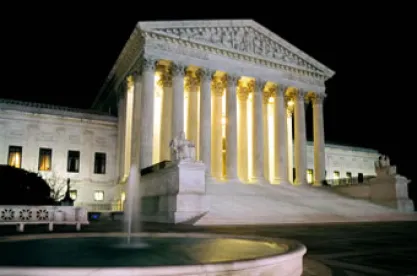In a 9-0 decision in Digital Realty Trust Inc. v. Somers, the US Supreme Court held that the whistleblower protection provisions contained in the Dodd-Frank Wall Street Reform and Consumer Protection Act apply only to individuals who report securities law violations to the US Securities and Exchange Commission—and not to those who report such concerns only through internal channels with their employer.
The Court’s February 21 decision resolves a circuit split—between the US Court of Appeals for the Fifth Circuit, on one hand, and the Second and Ninth Circuits, on the other hand—as to whether an individual must first report to the US Securities and Exchange Commission (SEC or the Commission) to be entitled to protection by the Dodd-Frank whistleblower protection provision.
Background
Plaintiff Paul Somers worked as a vice president for Digital Realty Trust Inc. from 2010 to 2014. Mr. Somers alleged that Digital Realty terminated his employment shortly after he reported suspected securities law violations by the company to its senior management. Mr. Somers did not report his concerns to the SEC before his termination. He also did not file an administrative complaint within 180 days of his termination, which rendered him ineligible for relief under the whistleblower provision in the Sarbanes-Oxley Act of 2002.1 Digital Realty moved to dismiss, arguing that Mr. Somers did not qualify as a whistleblower under Dodd-Frank because he did not report his concerns to the SEC before his termination, but rather reported them only internally to Digital Realty.
The district court denied the motion, holding that Mr. Somers’ internal report to Digital Realty qualified him as a whistleblower subject to protection under the Dodd-Frank whistleblower provision. The Ninth Circuit affirmed, joining the Second Circuit in Berman v. Neo@Ogilvy LLC2 in holding that internal reports of securities law violations to employers are protected by the Dodd-Frank whistleblower provision, which prohibits employers from retaliating against “whistleblowers” who engage in certain types of protected conduct. The anti-retaliation language under 15 USC Section 78u-6(h)(1)(A) states the following:
No employer may discharge, demote, suspend, threaten, harass, directly or indirectly, or in any other manner discriminate against, a whistleblower in the terms and conditions of employment because of any lawful act done by the whistleblower—
(i) in providing information to the Commission in accordance with this section;
(ii) in initiating, testifying in, or assisting in any investigation or judicial or administrative action of the Commission based upon or related to such information; or
(iii) in making disclosures that are required or protected under the Sarbanes-Oxley Act of 2002 (15 U.S.C. 7201 et seq.), this chapter, including section 78j–1(m) of this title, section 1513(e) of title 18, and any other law, rule, or regulation subject to the jurisdiction of the Commission.
(emphasis added).
Dodd-Frank also defines the term “whistleblower” to mean “any individual who provides . . . information relating to a violation of the securities laws to the Commission, in a manner established, by rule or regulation, by the Commission.”3
Both courts found that there was tension between Dodd-Frank’s definition of “whistleblower,” which limits protection to individuals who make reports “to the Commission,” and the anti-retaliation provision, which prohibits retaliation for “making disclosures that are required or protected under [Sarbanes-Oxley], this chapter, . . . section 1513(e), and any other law, rule or regulation subject to the jurisdiction of the Commission.”4
Given this purported ambiguity, the Ninth Circuit and the Second Circuit applied Chevron deference to 17 CFR Section 240.21F-2, an SEC regulation indicating that individuals who do not report to the SEC and instead report securities law violations internally are protected by the Dodd-Frank whistleblower protection provision. The Fifth Circuit, however, in Asadi v. G.E. Energy (USA) LLC,5 had held that under the unambiguous definition of “whistleblower” in Dodd-Frank, an employee must take his or her concern to the SEC in order to qualify for Dodd-Frank whistleblower protection, and it rejected the SEC regulation to the contrary.
The Supreme Court’s Opinion
The Opinion, authored by Justice Ruth Bader Ginsburg, held that Dodd-Frank unambiguously limits its anti-retaliation provision to only those individuals who meet the statutory definition of “whistleblower”—meaning individuals who report information to the SEC. The Court reasoned that, on its face, the definition of “whistleblower” applies to the entirety of Section 78u-6, including the anti-retaliation provision contained in Section 78u-6(h). Accordingly, the Court determined that the definition of “whistleblower” in Section 78u-6(a)(6) describes who is eligible for protection, and Section 78u-6(h) then describes three types of conduct which, when engaged in by a “whistleblower,” are protected. As such, the Court reasoned that an individual must both meet the definition of “whistleblower” and engage in one of the three types of protected conduct in order to qualify for whistleblower protection under Dodd-Frank. Thus, only individuals who report securities violations to the SEC are protected by the Dodd-Frank whistleblower provision.
The Court explained that its interpretation is supported by the “core purpose” of Dodd-Frank, which is to aid the Commission’s enforcement efforts by motivating people who know of securities law violations to “tell the SEC.” The Court pointed out that Dodd-Frank’s reward program, which provides substantial monetary rewards to whistleblowers who furnish actionable information to the SEC, and the whistleblower anti-retaliation program, “work synchronously to motivate individuals with knowledge of illegal activity to ‘tell the SEC.’”6 In other words, the US Congress complemented the Dodd-Frank monetary incentives for SEC reporting by heightening protection against retaliation for whistleblowers who report to the SEC. Whistleblowers who raise concerns about securities violations already are covered by the Sarbanes-Oxley whistleblower provision.7 Under Sarbanes-Oxley, if an employee files an administrative complaint within 180 days of the termination or retaliation, and prevails in the complaint, they may recover backpay with interest. Dodd-Frank enhanced the protection already provided by Sarbanes-Oxley if a whistleblower takes the extra step of providing information to the SEC. In that case, a Dodd-Frank whistleblower retaliation claim may be filed directly in federal court, is subject to a six-year statute of limitation, and entitles a prevailing Dodd-Frank whistleblower to recover double backpay with interest.
The Court also observed that its interpretation was reinforced by the fact that another whistleblower provision in Dodd-Frank related to the Consumer Fraud Protection Act explicitly covers internal complaints to employers and does not require a report to the Consumer Financial Protection Bureau. According to the Court, the inclusion of this language by Congress in one whistleblower provision in Dodd-Frank but not in Section 78u-6 suggests that Congress intended to exclude internal complaints from coverage under Section 78u-6.
The Court also rejected arguments that Dodd-Frank is ambiguous and that the Court should defer to the SEC regulation indicating that individuals who do not report to the SEC and instead report internally are protected by the Dodd-Frank whistleblower protection provision.8 The Court found no ambiguity in the Dodd-Frank whistleblower provision, given that the definition of “whistleblower” plainly requires an individual to make a report “to the Commission.”
The Court also rejected the argument that the definition of “whistleblower” in Section 78u-6(a)(6) and clause (iii) of Section 78u-6(h)(1)(A) are inconsistent. Rather, these provisions unambiguously protect “whistleblowers” who make reports both to the SEC and to a second entity, and who are retaliated against for the second report. As a result, the Court found that the SEC regulation extending Dodd-Frank whistleblower protection to internal whistleblowers was not entitled to deference.
The Court also found unpersuasive the argument that the Court’s interpretation unfairly would exclude from Dodd-Frank’s whistleblower protection provision individuals such as auditors, attorneys, and other employees required to report information internally before making external disclosures. The Court reasoned that these individuals would be shielded by Dodd-Frank as soon as they disclosed to the SEC, and that Congress may have determined that these individuals already were adequately protected by Sarbanes-Oxley’s whistleblower protections even if they do not disclose to the SEC. As noted above, Sarbanes-Oxley contains a whistleblower provision that prohibits employers from discharging or otherwise retaliating against individuals who raise concerns internally about certain enumerated securities violations.9
Conclusion
An individual who reports a securities violation only internally to the employer or to a government agency other than the SEC is not covered by Dodd-Frank, but may still be covered by the Sarbanes-Oxley whistleblower protection provision. Employers should continue to promote internal reporting through various compliance channels, as that is the best way to learn of issues and remediate them prior to SEC involvement.
1. 18 U.S.C. § 1514A et seq.
2. 801 F.3d 145, 155 (2d Cir. 2015)
3. 15 U.S.C. § 78u-6(a)(6) (emphasis added)
4. 15 U.S.C. § 78u-6(a)(6); id. § 78u-6(h)(1)(A)(iii)
5. 720 F.3d 620, 621 (5th Cir. 2013)
6. The Court gleaned this purpose from a Senate Report regarding the Act. Justice Thomas filed a concurring opinion joined by Justice Alito and Justice Gorsuch, objecting that Justice Ginsburg’s reliance on legislative history is inappropriate where, as here, the statute is unambiguous. Justice Sotomayor also filed a concurring opinion, joined by Justice Breyer, disagreeing with Justice Thomas’ concurrence and arguing that legislative history is an appropriate aid even when interpreting an unambiguous statute.
7. 18 U.S.C. § 1514A
8. 17 C.F.R. § 240.21F-2
9. 18 U.S.C. § 1514A






 />i
/>i

